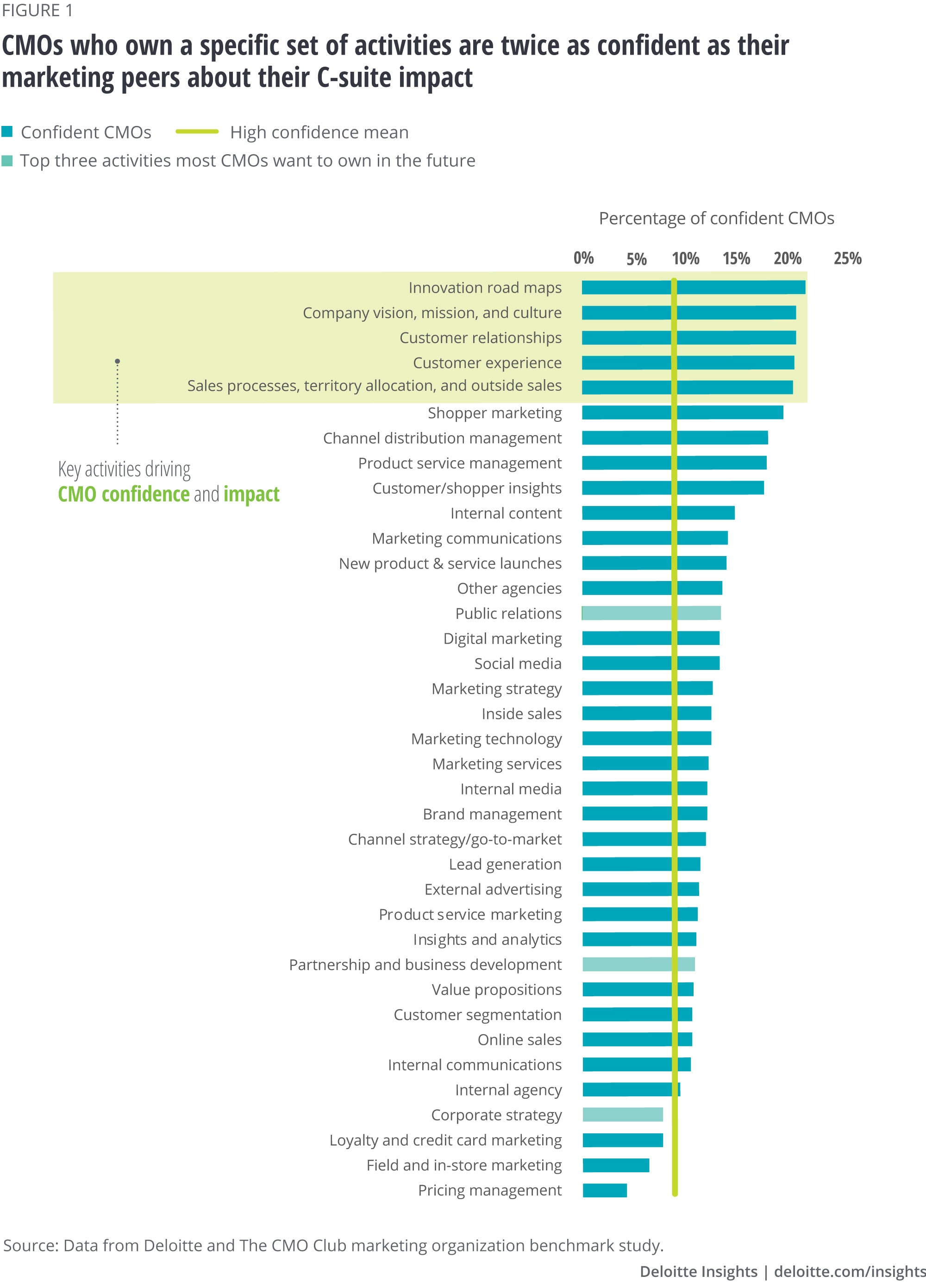
Course correcting the evolution of the CMO Positioning the CMO for greater organizational impact and C-suite influence
9
17 July 2020
Is there a clearer path for CMOs to increase their impact? Research suggests CMOs who own innovation road maps, company mission and vision, customer experience, and sales initiatives are twice as confident as their peers of having an impact on the organization—and the C-suite.
The near decade-long transformation of the chief marketing officer (CMO) role is now well established in the minds of most C-level executives. Growing expectations from the business and from C-suite peers, combined with increasingly digitally savvy, empowered customers, have drastically altered—and increased—the scope of the CMO. In our previous study, Redefining the CMO,1 we found the role is moving from being a campaign runner to customer strategist, from tactician to profit and loss (P&L) owner and growth driver, and critically, from department head to enterprise business leader.2 This new environment has resulted in an explosion of complexity for the role. The stakes are high for the CMO to either raise their influence in the top echelons of the C-suite or see misaligned expectations and poor role-scoping chip away at the relevance of the marketing organization and, ultimately, CMO tenure.3
Learn More
Explore the leadership collection
Learn about Deloitte’s services
Go straight to smart. Get the Deloitte Insights app
Perhaps it's unsurprising then, that when we asked CMOs how they are impacting the strategic direction of their organization and influencing peers in this new environment, only 5% perceived themselves as high-impact executives—the lowest self-ranking in the C-suite.4 In the next iteration of our research, we wanted to better understand what separates these confident, high-impact CMOs from the rest of their peers.
To draw fresh insights, we benchmarked 401 marketing organizations from some of the world’s biggest brands. Our goal was to understand how leading CMOs are operationalizing their organizations in terms of what they are accountable for today, what they want to own in the future, and how they measure the performance of their initiatives (see sidebar, “Methodology”). Two striking findings emerged:
- Many CMOs are focused on owning scope with less impact: Our research suggests the three activities most CMOs are focused on owning in the future aren’t correlated with high confidence and impact.
- There’s a clearer path to C-suite confidence and impact: However, a small cohort of CMOs who own a specific set of activities, such as innovation road maps, customer experience, and sales initiatives, are more than twice as confident as the rest of their marketing peers that they are making an impact in the C-suite.
Are some CMOs focused on owning the wrong things? Our research suggests the evolution of the CMO role needs course correction if they’re going to be positioned for greater impact and C-suite influence.
Methodology
The study was conducted by Deloitte and The CMO Club, a global community of marketing executives, to benchmark the marketing organizations of more than 400 CMOs from across the world, averaging nine years of cumulative CMO or head of marketing experience. Survey data was contextualized with in-depth interviews from brand leaders in a wide range of industries.5 The analysis also drew insights from Deloitte’s Confident CMO study, an online survey of 575 C-level executives from Fortune 500 companies.6
The illusion of the “big three”
The evolution of the CMO has understandably resulted in a massive increase in the scope of the role. Consider this marketing organization benchmark study, which included 50 distinct activities that might fall within a CMO’s accountability, depending on how their organization is structured. When we asked CMOs what they own today, the top responsibilities they indicated were: product/service marketing (86%), channel strategy/go-to-market (81%), marketing strategy (72%), and marketing technology (67%).
To better understand how CMOs are looking to elevate their impact and role within the organization, we asked which of these 50 activities they believe they should own. Overwhelmingly, CMOs most often wished to own three major activities: business partnerships (69%), corporate strategy (67%), and public relations (56%).
Yet, when we isolated and studied our high-confidence, high-impact CMOs, the data showed these activities are not the biggest game-changers in making a more impactful CMO. Seeking to own these activities certainly doesn’t hinder, but our research suggests relatively low correlation between ownership of these activities and CMO impact on the organization. This is perhaps a counterintuitive insight to think about for CMOs aspiring to forge a clearer path to company impact and influence.
Shifting the focus to increase impact and influence
So, which activities do the most influential CMOs own? Our analysis found four key areas CMOs could best be served to focus their efforts and attention: innovation road maps; company mission, vision, and values; customer relationships and experiences; and sales processes and territories (figure 1). Strikingly, CMOs who own this specific set of activities are twice as confident as the rest of their peers about significantly impacting the strategic direction of their organization and successfully influencing their C-suite peers.

Let’s take a look at each of these activities in detail and how CMOs can use their influence in these areas to impact the strategic direction of the organization:
- Setting the innovation road map: CMOs can serve as innovation catalysts for their organizations. They can do so by leveraging their unparalleled knowledge of the customer to create breakthrough offerings and advance customer experience through innovative design, partnerships, and experimentation. Driving this type of innovation is strongly correlated with CMO impact. However, currently only 10% of the surveyed executives own this high-value activity and just 5% want to own it in the future. Consider the example of Hyundai Motor America’s former CMO, who harnessed new technologies such as augmented reality to drive sales and, ultimately, bring about changes in the way customers buy cars across the automotive industry.7
- Crafting company mission, vision, and values: As the brand architect of their organization, CMOs have a unique opportunity to help the business set its strategic direction. They can do this by creating a truly purpose-driven enterprise where the brand and its commitment are connected to its customers, employees, and communities. However, just 7% of senior marketers in our study want to own this high-value activity. Consider the impact of a purpose-driven business such as Beautycounter, which has positioned itself as an advocacy-over-product brand. By pushing for stricter regulations, Beautycounter indicates that it is working to shift the entire industry away from questionable ingredients in products.8
- Owning customer relationships and experiences: CMOs are the C-suite’s best-positioned executives to realize long-term customer value and bottom-line business results by building best-in-class customer experiences and lasting customer relationships. Our study found CMOs have a mixed view on ownership of these activities. Although 41% of the surveyed executives want to own customer experience in the future—a percentage that aligns with the CMO’s elevated role around all things customer—only 21% of them own it today. This leaves many CMOs potentially outside the scope of this critical activity. When it comes to owning customer relationships, a starker gap exists, with 16% owning the activity today, and just 5% wanting to own it going forward. However, our research suggests customer experience and relationships are foundational to the brand building and growth-driving activities that can enable the CMO to be a truly transformational member of the C-suite.
- Designing sales processes and territories: Our previous research found that CMOs have to do a lot of work to get buy-in from the chief sales officer.9 Future ownership of sales process (4%) and sales territory (3%) is an area few CMOs want to add to their purview. But our latest study found a strong correlation between CMO impact and ownership of key activities in the marketing funnel through which organizations turn leads into customers. The data shows that ownership of lower-funnel activities, such as purchase behavior, results in greater impact—suggesting this should be a key focus and collaboration area for marketers (see sidebar, “Collaborating with sales: How the ‘inverse funnel’ can grow CMO impact”). Sales activities may not be the traditional remit for many CMOs, but as organizations break down functional barriers, they’re increasingly having CMOs take on multiple customer-related roles across the organization. Unilever’s creation of the chief digital and marketing officer position and the rise of the chief growth officer title in other organizations underscore this evolution.10
Thankfully—and perhaps intuitively—these four activities are best aligned with the CMO’s core competencies. As most of the C-suite recognizes, the CMO is often the singular executive with unmatched customer expertise and is best positioned to be the customer champion for the organization.11 It stands to reason that thanks to this deep customer expertise, CMOs have incredible, untapped potential to drive innovation, company vision and mission, and sales processes—all through the lens of the customer.
Collaborating with sales: How the “inverse funnel” can grow CMO impact
Our analysis found that it’s not just the activities CMOs own but also how they measure and report their performance that defines their impact on the organization and the C-suite. We asked CMOs which part of the customer funnel they are responsible for—from the upper-funnel activities of awareness and consideration to mid-funnel lead generation to lower-funnel final purchase. A majority of the surveyed executives (50%) are accountable for awareness as their core success metric. However, figure 2 shows that CMOs whose responsibilities lie in the lower funnel and who are accountable for the final purchase were twice as confident in their ability to make an impact than the rest of their peers. The result is essentially an inverse funnel, where high-impact CMOs gain in confidence as their responsibilities are increasingly tied to bottom-line business results.

We also know from past research that the rest of the C-suite wants marketing to speak their language, and that language is clearly anchored in sales, which drives growth.12 However, the new survey results do not suggest that CMOs should forgo measuring awareness. Instead, taking cues from the behavior of high-impact CMOs, marketers can focus on the last mile of the customer journey. This can help them tie in customer behavior with purchase and align their internal messaging to C-suite peers around these high-impact, lower-funnel activities.
Charting a clearer course to greater C-suite impact
The findings of the survey clearly show that CMOs should correct the course of the evolution of their role to make an impact on the C-suite. This means, they should strategically choose the activities on which they focus their efforts; how they influence their peers to scope their roles; and how they measure—and message—their successes. Here are some recommended actions for CMOs to calibrate their approach in this direction:
- Start with your position of organizational strength: As the C-level executive closest to the customer, CMOs can bring tremendous value to the enterprise. The fact that the C-suite already recognizes this expertise of the marketing function makes it a natural starting point for the CMO. CMOs should use their unique insights to galvanize their confidence as the C-suite’s go-to expert on the customer, bringing valuable perspectives to the table and leading strategic C-suite discussions if they don’t already own them.
- Use customer expertise as an inroad to owning other activities: Given their credentialed customer knowledge, CMOs are positioned to chart a customer-driven innovation road map that holistically meets customer needs and drives bottom-line value at the same time. The CMO can help ensure the organization is living out the same values and mission it messages to the customer. This toehold into organizational strategic thinking widens the aperture for the CMO to play a more influential role in activities many don’t yet see as marketing’s remit.
- Collaborate with sales to influence territory and processes: Being closely tied to lower-funnel activities and results can help CMOs demonstrate their impact in financial terms—something that resonates with their peers. CMOs can collaborate with chief sales officers to define customer-orientated processes and territory designs that leads to better lower-funnel results. Although many marketers feel this is one of their most difficult challenges,13 the survey data offers fresh evidence that those who focus their efforts on the final purchase make the most impact on the organization.
- Be title agnostic: CMOs shouldn’t be contained by their title—or the debate on the changing title.14 As industries converge, organizations are breaking down internal silos to tap into disruptive opportunities and capture the hearts and minds of their customers. Naturally, this results in greater scope and complexity for the CMO, as for other C-suite roles. Rather than the title, CMOs should focus on the scope, the impact, and the results of their role.
Our research confirms that the CMO’s C-suite peers routinely recognize their customer expertise. But CMOs don’t always fully understand how valuable these insights can be to the entire organization. By confidently bringing their unique customer expertise to the strategic table, CMOs can open new doors to collaborations across the C-suite. And, in doing so, they can transform every facet of the enterprise into a customer-centric endeavor—thereby making a greater impact on the organization and the C-suite.
Insights for the CMO
-
Bringing authenticity and agility to the digital age Podcast4 years ago
-
Beyond marketing: Experience reimagined Article5 years ago
-
2023 Global Marketing Trends: Resilient seeds for growth Interactive1 year ago
-
The makings of a more confident CMO Article5 years ago
-
Leadership Collection












